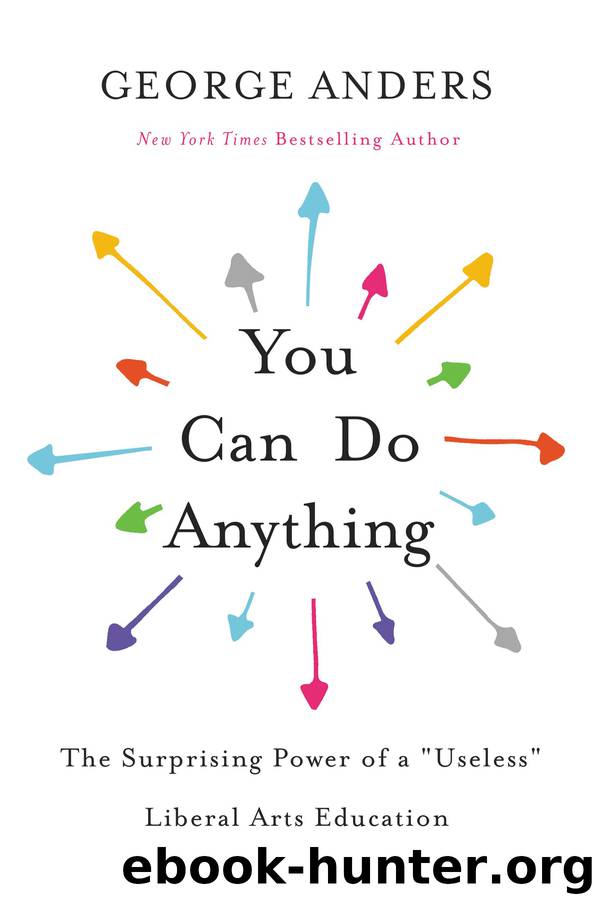You Can Do Anything by George Anders

Author:George Anders
Language: eng
Format: epub
Tags: Education / Counseling / Career Development
Publisher: Little, Brown and Company
Published: 2017-08-08T04:00:00+00:00
Conquering the Stock Market
Liberal arts degrees on Wall Street? You won’t find such credentials everywhere; much of the financial sector is staffed by people who loved money as little children and went on to earn a bachelor’s degree in economics or finance so they could chase riches as briskly as possible. All the same, there’s an island of diversity when it comes to people who excel as professional investors. A surprisingly large number of these money managers hold humanities degrees, most commonly in philosophy.
Consider George Soros, who studied philosophy at the London School of Economics before building an investment fortune that Forbes magazine estimates at $24.9 billion. In books such as The Alchemy of Finance, Soros argues that his entire life has been an exploration of the interplay between thinking and reality, with successful trading strategies emerging as a happy by-product. His favorite zone of exploration: the ways crowd mentalities can take hold and briefly distort reality before eventually disintegrating. By exploiting this dynamic, which he calls “the principle of reflexivity,” he has made billions trading oil stocks, betting against the British pound, and so on. Investment successes made him famous, but in Soros’s words, “the abstract came first.”
The two biggest mutual-fund companies in the United States, Vanguard and Fidelity, are both run by people with strong liberal arts backgrounds. Vanguard CEO Bill McNabb was a government major at Dartmouth, and Fidelity CEO Abigail Johnson studied art history at Hobart and William Smith. Both of them earned MBAs a few years after graduating from college; they can hold their own just fine in meetings focused on the usual business metrics. Still, both acknowledge in media interviews that their companies’ biggest opportunities call for a curious, open-minded perspective that isn’t bounded by what’s on today’s spreadsheet. “Don’t assume that the answers are out there in the form of somebody else already doing something,” Johnson told Forbes.com in 2013. “Sometimes they are. But you have to think beyond that. The right answer for you and your organization might not be something that’s been done before.”
Large-scale investing is where the cerebral types hang out. Professional investors read incessantly. They join organizations such as the Council on Foreign Relations, partly because they want geopolitical insights that could help them make money and partly for the impractical reason that it’s interesting to ponder China’s future. A disproportionate number end up as college trustees, allowing them to reconnect with academia. (Being willing to advise a school’s endowment managers helps too.) Even the hunt for bargain stocks is conducted in quasi-academic fashion, in conferences packed with leading New York money managers who deliver heavily footnoted lectures to one another.
One of America’s most combative (and successful) investors is Carl Icahn, a bearded, voluble man famous for buying stakes in underperforming companies and then pressing for strategic shake-ups. Executives resist, he hectors them, and before long, they usually capitulate. While working as a Wall Street Journal reporter in the early 1990s, I talked with Icahn half a dozen times in the midst of these controversies.
Download
This site does not store any files on its server. We only index and link to content provided by other sites. Please contact the content providers to delete copyright contents if any and email us, we'll remove relevant links or contents immediately.
Weapons of Math Destruction by Cathy O'Neil(6279)
Cracking the GRE Premium Edition with 6 Practice Tests, 2015 (Graduate School Test Preparation) by Princeton Review(4293)
What It Really Takes to Get Into Ivy League and Other Highly Selective Colleges by Hughes Chuck(3760)
Fooled by Randomness: The Hidden Role of Chance in Life and in the Markets by Nassim Nicholas Taleb(3123)
The Tyranny of Metrics by Jerry Z. Muller(3072)
The Marketing Plan Handbook: Develop Big-Picture Marketing Plans for Pennies on the Dollar by Robert W. Bly(3062)
Ultralearning by Scott Young(2954)
The Official Guide for GMAT Review 2015 with Online Question Bank and Exclusive Video by Graduate Management Admission Council (GMAC)(2808)
Bull by the Horns: Fighting to Save Main Street From Wall Street and Wall Street From Itself by Sheila Bair(2770)
50 Economics Classics by Tom Butler-Bowdon(2571)
The Visual MBA by Jason Barron(2162)
The Inevitable by Kevin Kelly(1976)
Data Science for Business by Foster Provost & Tom Fawcett(1972)
Cracking the LSAT, 2012 Edition by Princeton Review(1955)
Out of the Crisis by Deming W. Edwards(1898)
GMAT Official Guide 2018 Verbal Review by GMAC (Graduate Management Admission Council)(1870)
The Personal MBA: Master the Art of Business by Josh Kaufman(1831)
The Conflict Resolution Phrase Book by Barbara Mitchell & Cornelia Gamlem(1779)
Maths and Stats for Web Analytics and Conversion Optimization by Himanshu Sharma(1706)
